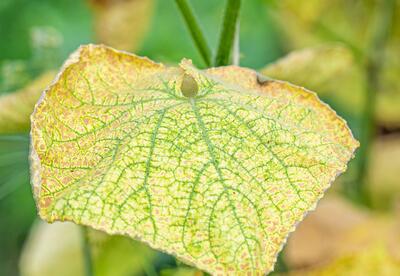
Image of E. amylovora infected apple with symptoms of bacterial oozing. Image courtesy of Janna Beckerman, Purdue University.
---FOR IMMEDIATE RELEASE---
Agdia, Inc. (Elkhart, IN) has commercialized an ELISA assay for detection of Erwinia amylovora, the causal agent of fire blight on apple and pear.
Erwinia amylovora is a gram-negative, rod-shaped bacterium that causes fire blight in several members of the Rosaceae family, including Malus (apple and crabapple) and Pyrus (pear). This pathogen is native to North America and is a quarantined invasive species in the European Union, subject to phytosanitary controls. Fire blight is considered a major threat to apple and pear production throughout the world.
Fire blight infections typically occur in the spring. Open flowers are the most common infection courts and remain susceptible until petal drop. Thereafter, infections can potentially spread to leaves, fruit, twigs, scaffolding limbs, trunks, and root systems, killing highly susceptible hosts. Symptoms of fire blight vary depending on the host; however, symptoms generally include water soaking, stem and leaf necrosis, and trunk and collar cankers. Shoot tips may wilt rapidly forming the characteristic “shepherd’s crook”. Active infections produce amber-colored bacterial ooze that exudes from cankers and fruit. This ooze is the primary inoculum and is disseminated locally by pollinating insects, wind, and splashing water. Long-distance dispersal of inoculum is via interstate movement of infected plant parts.
Agdia’s new E. amylovora ELISA was screened against a diverse collection of isolates, and it detected 100% of true positives. Moreover, this assay was shown to reliably detect Erwinia pyrifoliae, a closely related species known to cause tissue necrosis on pear in Asia and strawberries in Europe. Agdia states no cross-reactivity was observed for several potential cross-reactors, including Pseudomonas spp. and Xanthomonas spp. This assay was designed to be used on leaf, stem, bark, and fruit tissue, and pure culture.
This ELISA is sold as a reagent set and is available in 96, 500, 1000, and 5000 testwell sizes. Agdia provides a one-year warranty on purchased reagents. Later this season, Agdia will be releasing an ImmunoStrip® for the detection of E. amylovora. For more information on Agdia’s catalog of ELISA and ImmunoStrip® products, visit the company’s website at www.agdia.com.
About Agdia
A leading provider of diagnostic solutions for agriculture, Agdia, Inc. has been serving plant breeders, propagators, growers, universities, and private testing laboratories since 1981. The company offers a comprehensive portfolio of validated, easy-to-use diagnostics for identifying plant pathogens, hormones, and transgenic traits. In addition, Agdia operates an ISO accredited, in-house, testing services laboratory. Agdia’s quality management system is ISO 9001:2015 certified and their Testing Services Laboratory is ISO 17025:2005 accredited. Visit the company’s website at www.agdia.com, e-mail info@agdia.com, phone 1-574-264-2615 (toll-free 800-622-4342) or fax 1-574-264-2153. ImmunoStrip® is a registered trademark of Agdia, Inc.
###





